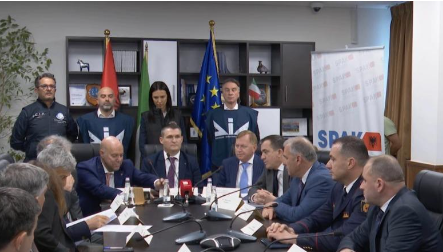In the theatre of Balkan geopolitics and European aspirations, Operation “Bridge” emerges as both spectacle and signal. At first glance, it appears as a coordinated
judicial success—a collaborative strike between Albanian and Italian authorities against a sprawling network of organized crime. Yet beneath the operational triumph lies a far more intricate reality, one that exposes the frailties and potentialities of the Albanian state in its pursuit of legitimacy, justice, and sovereignty.
Transnational Crime as the Mirror of a Fractured State
The crime network unravelled by this operation—spanning Shijak, Durrës, Tirana, and the metropoles of Milan, Rome, and Pisa—was not merely trafficking drugs or
laundering money. It was performing a choreography of control, silently weaving itself into the economic, social, and possibly political fabrics of two states. This is not just a criminal phenomenon; it is a reflection of how porous the borders between legality and illegality have become, and how adaptive modern mafias are in exploiting state weaknesses. But here lies the first enigma: Is the dismantling of such a network the result of institutional maturity—or merely the effect of external judicial scaffolding propping up a still-fragile system?
The role of SPAK, Albania’s anti-corruption and organized crime structure, was central. But its centrality invites scrutiny. Was this operation an expression of institutional autonomy, or a calculated alignment with EU expectations at a time when accession talks are precariously poised? The timing, coordination with Eurojust, and the narrative of ‘reform in action’ fit neatly into the broader storyline Brussels seeks. But politics is rarely that clean. There is a silent question reverberating through this case: Would this have happened without the push—and presence—of European judicial muscle?
The geography of the network—Shijak, a name that reappears like a refrain in reports on organized crime—hints at long-standing, unresolved fissures in Albania’s local governance. These are not just criminal strongholds; they are zones of hybrid sovereignty, where the authority of the state competes, coexists, or colludes with informal power. Here, “Bridge” is more than a name—it is a metaphor. A bridge between two legal systems, yes, but also between two realities: the one presented on paper and the one lived on the ground.
Politically, the operation will be paraded as proof of progress. It will likely be cited in future EU progress reports as evidence of Albania’s commitment to the rule of law. But in Brussels, as in Tirana, there is growing awareness that a few high-profile arrests do not constitute structural reform. The EU may praise the headlines, but it reads the footnotes carefully. The more profound question is whether this operation represents a break from the past—or a well-timed performance within it.
The Unspoken Calculations
Who was arrested is known. But who remains untouched? That question is more political than judicial. Networks of organized crime do not survive without protection—protection that flows from influence, silence, or complicity at higher levels. Whether the scaffolding of this operation will climb that high remains to be seen. And so, Operation “Bridge” leaves us with a paradox: It is both a manifestation of strength and a confession of dependence. A state that can strike like this—but only with help—remains half-sovereign, seeking to build bridges not just with justice, but with credibility.
In the final analysis, “Bridge” is a beginning, not a conclusion. It is a litmus test for a nation caught between the weight of its post-communist past and the unfinished
architecture of its European future. Whether Albania can walk this bridge alone—or must always be led across—will define not only its fight against organized crime, but the kind of state it aspires to become.
Written by our correspondent A.T.



